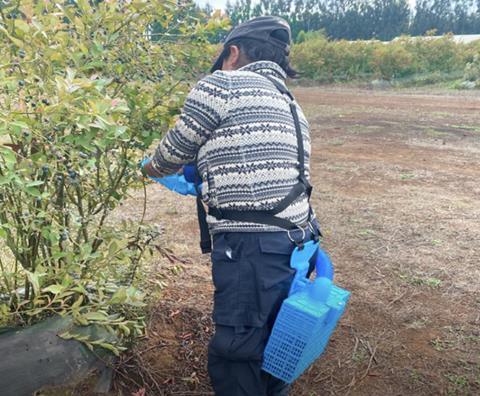Device shows 7 per cent increase in productivity and 87 per cent reduction in fruit losses in manual harvesting
Chile’s Catholic University of Temuco (UCT) has developed an innovative manual harvesting tool for blueberries that it claims can increase productivity and improve working conditions for pickers.

According to its inventors, Javier Ignacio Dueñas and María Paula Simian, the device has been designed to adapt to different body types and ergonomic conditions, allowing workers to harvest blueberries faster and with less effort.
It features an adjustable fastening system that adapts to the worker’s body, minimising physical effort and reducing the risk of injury in the cervical and lumbar areas.
The device also includes a light and resistant receptacle that stores the blueberries without damaging them, preserving the fruit’s protective bloom. Its modular design facilitates cleaning, maintenance and adaptation of use to different sizes and varieties of blueberries.
And because it is made with recycled polymers, it is durable even under the high temperatures of the harvest season and ensures a long life in demanding field conditions.
Field tests carried out under different conditions showed a 9.7 per cent increase in productivity, along with an average 50 per cent increase in the worker’s harvest speed. Moreover, it reduced fruit losses during the manual harvesting process by 87 per cent.
Furthermore, seasonal workers using the device experienced a significant decrease in muscle fatigue, preventing future musculoskeletal injuries and pain in areas such as the lumbar spine, cervical spine and scapulohumeral joint, common in traditional harvesting.
Simian said the tool represented a major advance in manual blueberry harvesting. “It has been and specifically designed to improve both the harvesting process and the working conditions of the harvester, prioritising worker health and the efficiency of the production system,” she commented.
“Thanks to this tool, we will be able to ensure faster harvesting with less effort, significantly reducing fruit losses and work-related injuries among harvesters. We are committed to innovation that not only optimises processes but also takes care of our people. This development is a step towards more sustainable and humane agriculture.”
Dueñas added: “This achievement is a clear reflection of how science and technology can work together to solve real challenges in our society, making agriculture more sustainable and respectful of those who cultivate our land”.
Simian, Dueñas and the UCT said they will continue to improve the tool and launch it both nationally and internationally.



